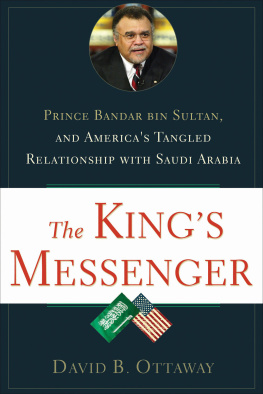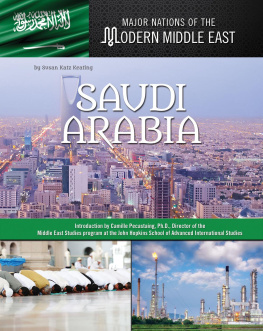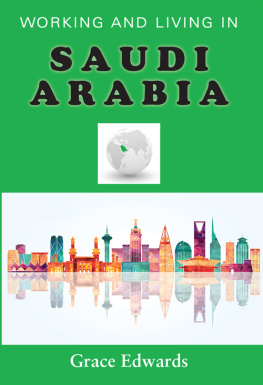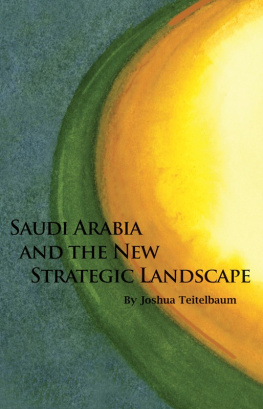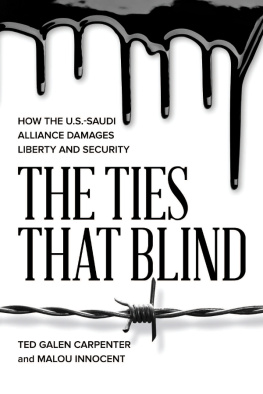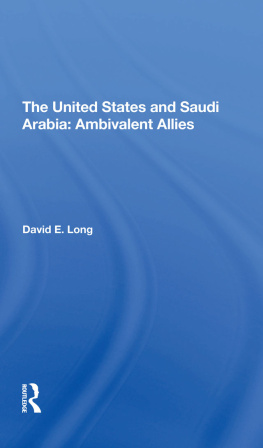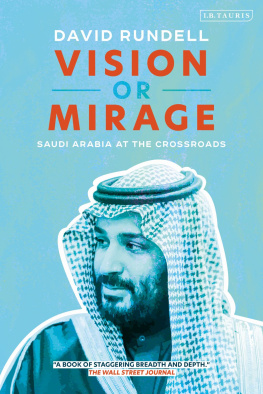The Kings Messenger
BY THE SAME AUTHOR
Chained Together:
Mandela, De Klerk, and the Struggle to Remake South Africa
The Kings Messenger
PRINCE BANDAR BIN SULTAN AND AMERICAS TANGLED RELATIONSHIP WITH SAUDI ARABIA
David B. Ottaway

Copyright 2008 by David B. Ottaway
All rights reserved. No part of this book may be used or reproduced in any manner whatsoever without written permission from the publisher except in the case of brief quotations embodied in critical articles or reviews.
For information address Walker & Company, 175 Fifth Avenue, New York, New York 10010.
Published by Walker Publishing Company, Inc., New York
All papers used by Walker & Company are natural, recyclable products made from wood grown in well-managed forests. The manufacturing processes conform to the environmental regulations of the country of origin.
LIBRARY OF CONGRESS CATALOGING-IN-PUBLICATION DATA
Ottaway, David.
The kings messenger : Prince Bandar bin Sultan and Americas tangled relationship with Saudi Arabia / David B. Ottaway.1st U.S. ed.
p. cm
Includes bibliographical references.
eISBN: 978-0-802-77764-5
1. Bin Sultan, Bandar, Prince. 2. AmbassadorsSaudi ArabiaBiography. 3. Saudi ArabiaForeign relationsUnited States. 4. United StatesForeign relationsSaudi Arabia. I. Title DS244.526.B55O882008
327.56073092dc22
[B]
2008030319
Visit Walker & Companys Web site at www.walkerbooks.com
First U.S. edition 2008
1 3 5 7 9 10 8 6 4 2
Typeset by Westchester Book Group Printed in the United States of America by Quebecor World Fairfield
To my wife, Marina
Contents
During thirty-five years at the Washington Post, I had occasion to write repeatedly about Saudi Arabia and its first royal ambassador to the United States, Prince Bandar bin Sultan. My initial article appeared in October 1972 while I was covering the annual conference of the Middle East Institute in Washington. At the time, few U.S. officials or Washington think tanks were paying much attention to the Saudis. The prevailing viewpoint was that they needed Uncle Sams protection far more than the Americans needed Saudi oil. At the conference, Saudi oil minister Sheikh Ahmed Zaki Yamani made an intriguing offer to the Nixon administration: If the United States would assure Saudi oil duty-free access to the U.S. market, the kingdom would guarantee an uninterrupted flow of crude to meet the nations needs. The proposal was rejected out of hand by both the Nixon White House and American oil companies. But for me the story triggered what was to become a career-long fascination with that distant kingdom so important to America because of its vast oil reserves and religious authority.
Over the following year, my Post colleague Ronald Koven and I wrote a series of articles about what we felt was a looming oil crisis, and we highlighted the implications of Americas growing dependence on Arab, and particularly Saudi, oil. One of those implications came to light in the spring of 1973 when Yamani warned in an interview with us that unless Washington changed its policy toward Israel and the Palestinians, the Arabs were going to wield their oil weapon to force a change. Of course, no one in Washington took him seriously. But when war broke out in October 1973 between Israel and its Arab neighbors, the Saudis led Arab producers in a boycott of the United States that caused enormous indignation and shock in the White House and Congress. Suddenly, Saudi Arabia was at the center of American attention, and suddenly the prevailing assumption changed: We needed them as much as they needed us.
In March 1978, the Posts foreign editor, Peter Osnos, asked me to go with him on a visit to Riyadh, Saudi Arabias capital, even though I was then covering Africa and based in Addis Ababa. At that time, Saudi visas for American reporters were a rarity, and the newspaper was seizing on a Saudi invitation to take a peek inside the hidden kingdom. Little did I realize at the time that our visas were part of a Saudi public relations campaign under way in Washington to convince Congress to sell sixty supermodern F-15 fighter jets to the Saudis over the vehement objections of the powerful pro-Israel lobby.
Three years later, in 1981, I became the Posts bureau chief in Cairo, Egypt, from where I traveled to the kingdom repeatedly over the next four years. I wrote scores of stories about the four-hundred-billion-dollar construction boom occurring there as a result of the quadrupling of oil prices after the 1973 Arab boycott and about the social, political, and economic problems stemming from the making of a modern Saudi nation out of a medieval bedouin society. I had occasion to visit many obscure corners of the kingdom, but the trip that left the most lasting impression was to the largest plant ever built for the publication of the Koran in the Muslim world.
At the time of my visit, in 1984, the King Fahd Holy Koran Printing Complex was brand-new. It is located on the outskirts of the pilgrimage city Medina, which non-Muslims are strictly banned from entering. But my host, the late prime minister of Lebanon, Rafik Hariri, had decided to run the risk of official Saudi religious wrath anyway. His company, Oger Saudi, had built the plant. Hariri wanted me to get a sense of his accomplishments as well as the new Saudi ambition to spread its religious influence around the world. So he smuggled me into Medina on his private jet and took me in his limousine across the city, after ordering me to lie down on the backseat to avoid being seen.
As I learned during the visit, the kingdoms Wahhabi religious leaders were planning to take control of the Korans translation into multiple languages as well as the accompanying commentary on its verses. They also planned to hand out free copies to the two million Muslims who come from around the world each year to fulfill their religious duty to visit Mecca at least once in a lifetime. I still remember being awestruck as we wandered through the sprawling ground floor of the plant, which was filled with hundreds of printing machines that would shortly begin churning out tens of millions of copies a year. Later, I realized that I had been given the rare opportunity for a non-Muslim to witness one source of the kingdoms enormous soft power, its ability as custodian of Islams most holy sites, in Mecca and Medina, to spread its puritanical brand of Islam to the four corners of the earth.
Starting in 1985, I was stationed in Washington for five years working as the newspapers national security correspondent. In that role, I occasionally accompanied Secretary of State George Shultz on his visits to the Middle East and also reported on some of the secret machinations of Prince Bandar. The prince was regularly conducting clandestine missions for President Ronald Reagan and Central Intelligence Agency director William Casey in their crusade to bring down the Soviet evil empire. As it turned out, Bandar was at the same time negotiating behind their backs with communist Chinawith which Saudi Arabia had never had diplomatic relationsfor the supply of intermediate-range missiles built to carry nuclear warheads. When their arrival in the kingdom was finally discovered in early 1988, Israel and Saudi Arabia went to the brink of war before Washington intervened to diffuse the crisis. But Bandars deceit shocked the Reagan administration and cast him in a new light as a Machiavellian schemer ready to dupe his American friends if called upon to do so by king and kingdom.
Next page
